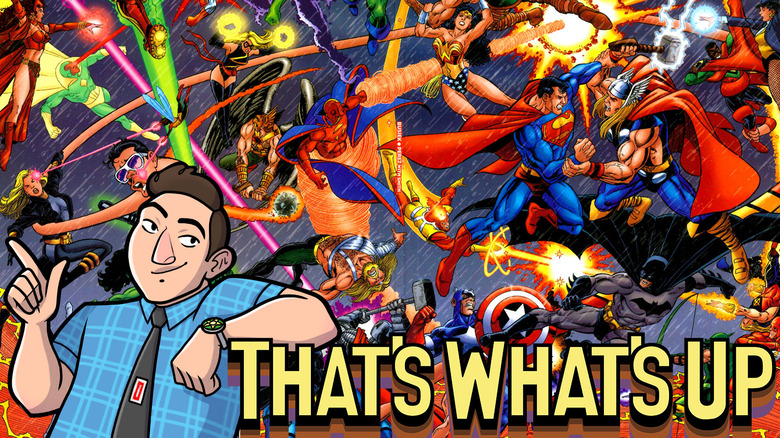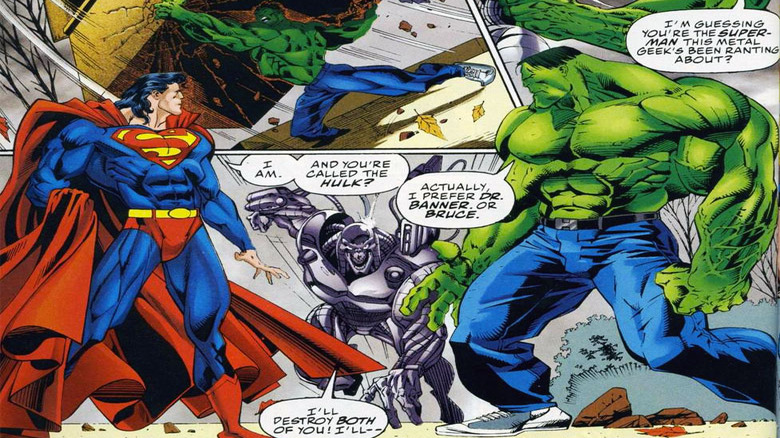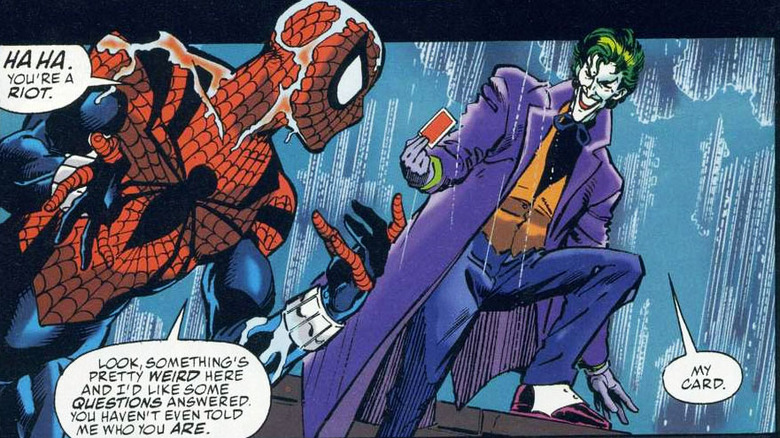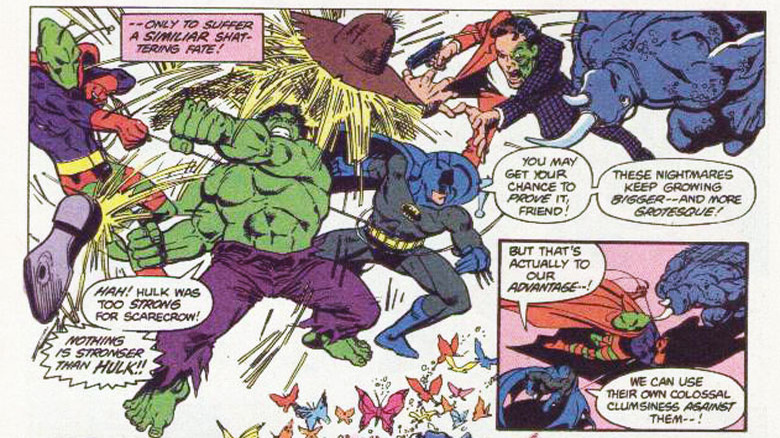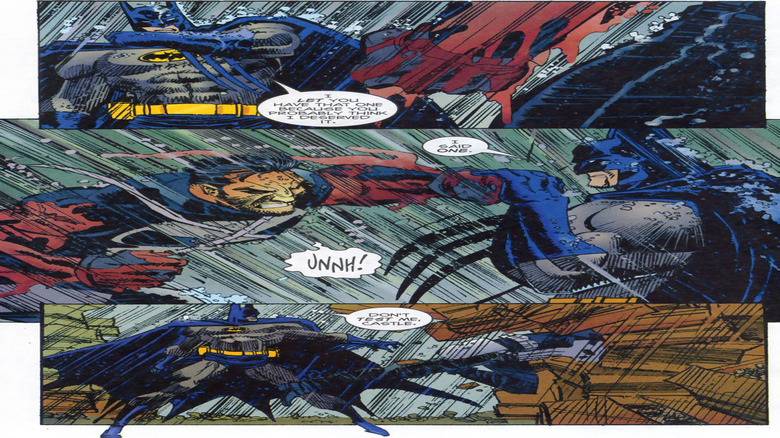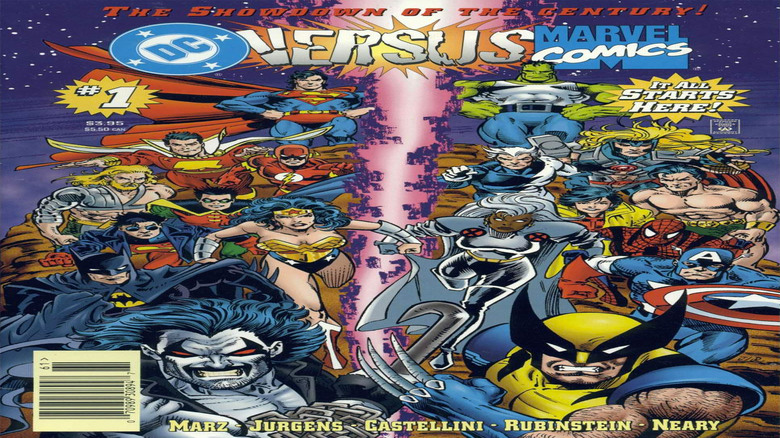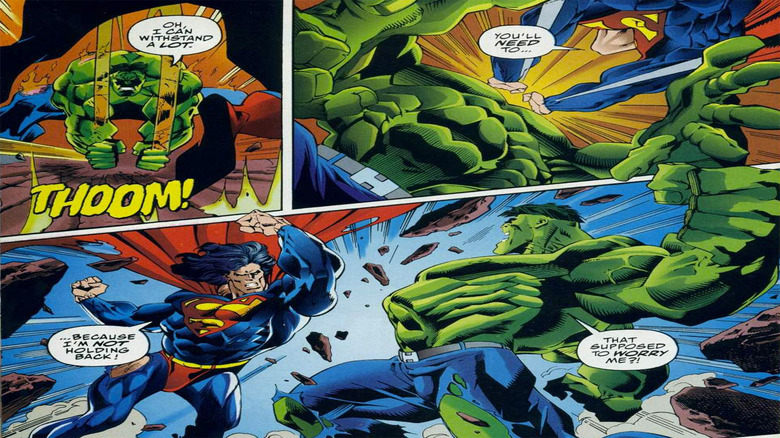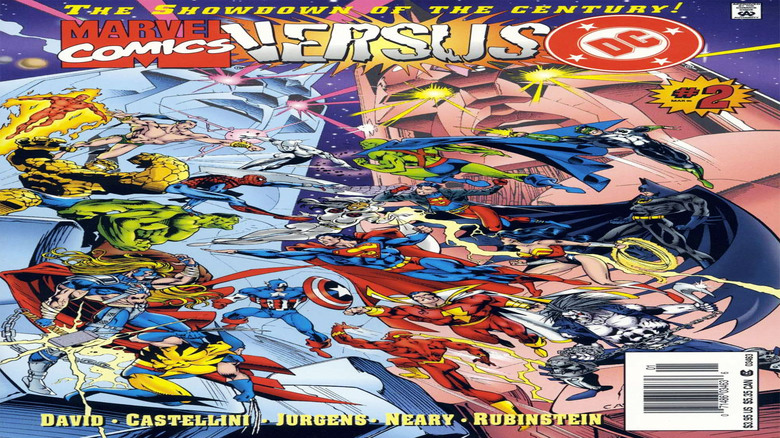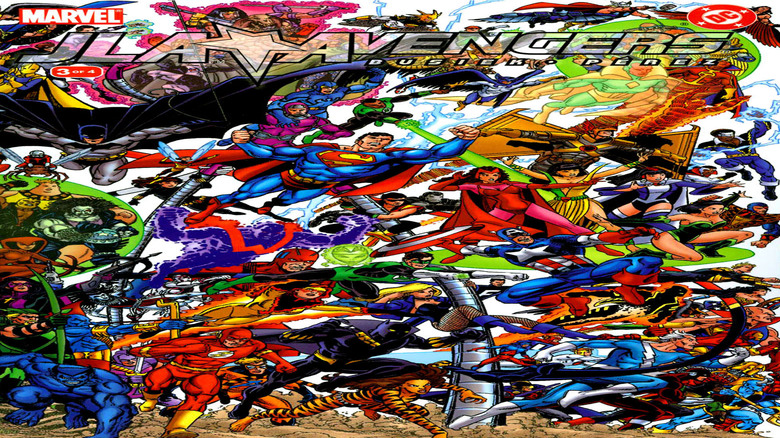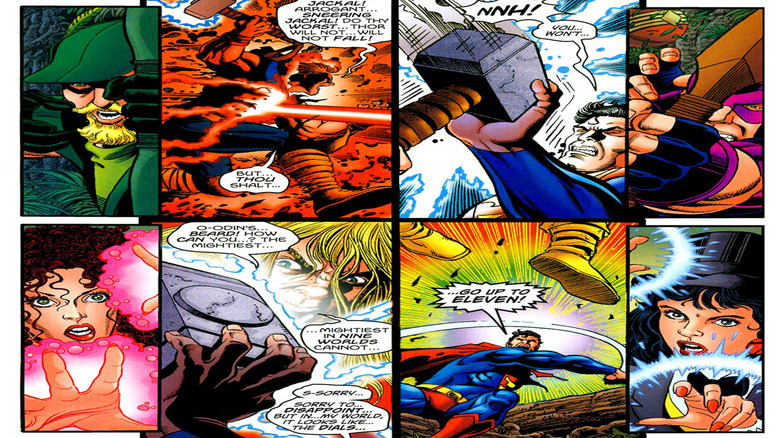That's What's Up: Who Would Win If The Justice League Faced Off Against The Avengers?
Each week, comic book writer Chris Sims answers the burning questions you have about the world of comics and pop culture: what's up with that? If you'd like to ask Chris a question, please send it to @theisb on Twitter with the hashtag #WhatsUpChris, or email it to staff@looper.com with the subject line "That's What's Up."
Q: Who would win if the Justice League faced off against The Avengers? — Charles Baylor, via YouTube
Ah yes. The classics.
Back when I was working at a comic book store, my fellow employees and I spent a lot of time—time that probably should've been devoted to making sure that the comics were in the right order and checking on what needed to be restocked or otherwise, you know, doing our actual jobs—on the classic time-waster of figuring out who would win in a fight. They're not really the kind of questions you're ever going to get a straight answer to, but that doesn't mean they're not worth asking.
Unstoppable Forces and Immovable Objects
The fact that you can't really get a solid answer leads a lot of people to dismiss the entire enterprise. It's why you see so many "who would win in a fight" questions leading to answers like "It depends on who's writing it," for instance, or my personal favorite, "who wins? The fans!" Those things are absolutely true, but they're also ultimately dismissive, and shift the question away from the fun of picking a side and trying to back up your choice and into discussing the stories as fictional constructs. The thing is, that's exactly the thing that makes it all so fun.
The reason that we as comics readers get fixated on the idea of which superheroes could win in a fight doesn't just come from the fact that it would be pretty cool to see Batman try to take down the Hulk. It comes from the simple fact that the heroes we read about are protagonists. They're designed to win, and the entire point of the story is to see how they do it. The real suspension of disbelief that comes from reading a comic book isn't in accepting that Superman can fly, or that there's a magic ring from space that turns willpower into a giant boxing glove—that's just the price of admission when you open one up and step into the genre. It comes from allowing ourselves to believe that this time, the good guys might not win, even though we know they always do.
That's what's so intriguing about pitting heroes against each other, whether it's Superman and Batman duking it out within the DC Universe or heading to the ultimate fight with someone from another company. And it's also the reason nobody ever talks about wanting to see what would happen if, say, Spider-Man fought the Joker.
Spider-Man and the Joker
As interesting as that fight might be, we all know how it's going to end without even having to think about it, because we know the rules of how those stories work. Spider-Man has a notoriously hard life, but in terms of big superhero battles, we've seen him win a thousand times because he's a protagonist, and we've seen the Joker lose almost as often.
That doesn't mean the Joker—or any other villain, really—is inherently a bad character or anything, or that pitting a hero against a villain is a bad way to tell a story. It's just the way that stories, particularly the kind of serialized adventure story that makes up the superhero genre, are structured. Even if you're not thinking about it, you're aware of it, and it affects how you view a story.
That's what's so appealing about asking who would win in a fight between heroes. By their very nature, protagonists are designed to win. So what happens when two characters who are meant to win all the time fight each other? Someone has to lose, right?
Not exactly.
Fight, then team up
When you're dealing with a crossover between two companies, nobody's going to volunteer to have their guys take the loss, for the simple reason that definitively showing one hero beating the other makes it pretty difficult to get people to keep on reading the loser's monthly adventures, especially when the winner's comic is sitting right there on the stands next to it. You can even see that when two heroes meet up within a single universe—just pick out pretty much any superhero book that launched in the '90s and look for the team-up story that's designed to lure in new readers and establish a character's place in the universe. It usually happens in #3, but I can all but guarantee that it'll happen within that first year.
Because of that, and because the very nature of the stories resist having the protagonists suffer a truly meaningful loss, they almost always fall into the same pattern: fight for a few pages, and then team up to face a larger threat. Which, incidentally, is also what's happened in the last three Fast and Furious movies, which is one more reason that we should go ahead and consider them the greatest superhero stories of the modern era. But that's a conversation for another time.
If you really want to get into the technical part of comics (and I'm not sure anyone does, so I'll keep this one quick), that's probably why you see so many crossovers throw in a slash instead of a "versus." Versus implies a fight, but slash just means they're hanging out in the same comic, and if you don't promise a fight, you don't actually have to decide who wins.
The only big exception to all this that I can think of is 1994's Punisher/Batman: Deadly Knights, by Chuck Dixon and John Romita Jr.
Everybody gets one
It follows the same team-up pattern—Batman and Punisher have to briefly join forces to take on a team-up between the Joker and Jigsaw—but when Batman refuses to let Punisher kill the bad guys, Frank takes a swing at him in a huge double-page spread. Batman responds by telling the Punisher that he let him have that one, and then backs it up by effortlessly catching Frank's second shot and flinging him headfirst into a brick wall. "I said one."
It's great, and it's also about as definitive a victory as one protagonist has ever had over another in the world of superhero comics, which is especially interesting since Dixon was actually writing Batman (in Detective Comics) and Punisher (in Punisher: War Zone) at the time. You'd think he'd be more directly invested than anyone in keeping things on equal footing. But it also makes sense—even the most die-hard Punisher fan would have a hard time backing up the idea that Frank Castle could take down a guy who went toe-to-toe with Superman and was usually characterized as the most competent member of the Justice League. He's tough, but c'mon. We have to have some kind of system here, or else everything falls apart.
That is, however, a rarity. But there have been a few times over the years where they actually have tried to provide a definitive answer, and one of the most notable happened in 1996: the appropriately titled DC vs. Marvel.
DC vs. Marvel, 1996
Ever since Superman first met Spider-Man back in 1976, DC and Marvel characters met each other quite a few times. This, however, was billed as the biggest crossover of all time, and honestly? It actually did deliver on that, even if the premise was the same sort of ridiculously simple "cosmic beings have decreed that we must fight!" setup that had been seen in quite a few stories by that point. There was one big difference, though: this time, it wouldn't be writers or editors or eve corporations that would decide who won. It would be the fans.
It's actually a pretty brilliant gimmick, because it made those endless "who would win in a fight" debates that were always raging in comic book stores an actual part of the story. The two cosmic brothers who were responsible for combining the two universes set up 11 fights—an odd number to guarantee that there wouldn't be a tie—and while six of them were scripted as part of the story, there were five left up to votes from fans: Superman vs. Hulk, Spider-Man vs. Superboy, Wolverine vs. Lobo, Storm vs. Wonder Woman, and the main event that everyone really wanted, Batman vs. Captain America.
In theory, leaving it up to the fans provides us with the definitive answer. In practice, well, it's a bigger work than WrestleMania, brother.
Superman vs. the Hulk
Most of the fights, even the ones that weren't left up to the fan votes, had incredibly unsatisfying endings where one hero beat the other on a technicality. The rules set up by the cosmic beings in charge of the fights allowed for a victory by immobilizing your opponent, so Aquaman vs. Namor, for example, ended with the Sub-Mariner being pinned to the ground after Aquaman called a whale to lay on him. Robin vs. Jubilee is even weirder.
Even the voted fights seemed geared towards staying as far away from a definitive ending as possible. Captain America and Batman slugged it out in a sewer, and Batman only got the victory after a pipe was flushed out at random, knocking Cap over and leading to an "aw shucks" moment where Batman saved him from drowning—again, in a sewer. It's not exactly an unexpected move, but it seems like almost every single fight was geared towards allowing any fan who was confronted with "Superman beat the Hulk!" to respond with an easy "yeah, but..."
It makes a lot of sense from a corporate perspective, but from a narrative standpoint, it's not exactly satisfying.
On top of that, those five fights that were left up to the vote seem more than a little bit rigged in favor of the House of Ideas. Three of them could've gone either way—Superman vs. Hulk is a classic debate, Batman vs. Cap is the one that everyone wanted to see, and Storm vs. Wonder Woman pit the two most popular women at each company against each other—but nobody in their right mind was going to vote for Superboy over Spider-Man, and thinking that there's any possible way for Wolverine to lose a popularity contest in 1996 is straight up ridiculous. Simon Bisley and Keith Giffen wouldn't have voted for Lobo to win a fight with Wolverine. Sabretooth and Lady Deathstrike wouldn't have voted for Wolverine to lose that fight.
The weird heroes of 1996
There's also the fact that DC vs. Marvel is a weird little artifact of its time, and its time was very specific. Rather than featuring timeless, iconic versions of the characters, they're all captured in a moment where everything's a little bit weird. Superman has a mullet, Thor's wearing his weird strappy '90s armor, Hulk is smart and has Bruce Banner's brain in control of his body, and—maybe worst of all — Spider-Man isn't even Peter Parker. It's Ben Reilly, his clone, who pretends to be Peter so that he has an excuse to hang out at the Daily Planet flirting with Lois Lane. You know, just in case things weren't complicated enough already.
Looking back, the most interesting aspect of the story wasn't the conflict between Marvel and DC, it was the way they came together at the end. At one point, the universes were combined, and the result was a handful of one-shots published under the banner of Amalgam Comics, where each hero was mashed up with a counterpart from the other company. Comics like Super Soldier (Captain America + Superman), Dark Claw (Batman + Wolverine), or Speed Demon (Ghost Rider + Flash) were way more entertaining than the event that spawned them. So much so, in fact, that they got another run of one-shots the following year.
So yeah, DC vs. Marvel didn't exactly answer the question that well. Fortunately, they took another shot at it in 2003, and it worked out a lot better.
JLA/Avengers, 2003
Rather than leaving it up to readers to decide, JLA/Avengers was the product of veteran comics creators Kurt Busiek and George Perez. At the time, they were just coming off a highly regarded run on Avengers, but they were veterans of both companies, with Perez probably being best known for work on Wonder Woman, Teen Titans, and, of course, Crisis on Infinite Earths. Busiek had done less work for DC prior to this story, but afterwards, he'd go on to write JLA and Superman, among other things. In other words, they were exactly the kind of team you'd want for the biggest crossover of all time.
Again, the premise involved cosmic beings smashing realities together, and again, it eventually turns into the fight-then-team-up story. That said, it's the platonic ideal of those things, done as well as they possibly could be, combined with a grand tour of each universe that highlights what makes them different and special, featuring every character who—as of 2003, at least—had ever been an Avenger or a member of the Justice League.
It's genuinely fantastic, which is a good thing since as of right now, it's also the last DC/Marvel crossover. And yet, it still doesn't answer that burning question of who would win—not entirely, at least. There are plenty of big fight scenes, including one where Batman admits that, if given enough time, Captain America could wear him down enough to beat him, and there's a big chunk of the second issue devoted entirely to Superman and Thor just beating the living hell out of each other, with the Man of Steel being the last one standing.
Superman beats Thor (and references Spinal Tap)
But alas. That's the closest that we've ever gotten to getting a defensive answer, and it still pretty much ends in a tie.
If you're asking who I think would take it, well, keep in mind that I'm someone who's actually done work for Marvel, but who has also been calling himself the World's Foremost Batmanologist ever since he dropped out of college to get that job standing around talking about whether Conan could beat Sgt. Rock in a fistfight. I'm just as tied up as everyone else, and even if I wasn't, you'd probably have to take whatever I said with a pretty massive grain of salt.
But again, a question like this that can go either way means that the fun part is in picking a side and backing it up yourself. Does Superman's vulnerability to magic extend to the Scarlet Witch's mutant powers? Is Iron Man better with his armor than Green Lantern is with a ring? Do Green Arrow and Hawkeye just sort of wander off somewhere and cancel each other out? What if Batman gets a hold of Mjolnir and becomes Bat-Thor? Every possibility changes everything about the fight, and spins off into a million other questions about whether Batman should be considered worthy enough to hold the hammer, or whether Tony Stark could work a Green Lantern ring. There's just too much to really filter it out.
Unless, of course, you're talking about the movie versions, which means you're really just asking if Wonder Woman could beat Captain America. And that one, I can't even begin to answer.
Each week, comic book writer Chris Sims answers the burning questions you have about the world of comics and pop culture: what's up with that? If you'd like to ask Chris a question, please send it to @theisb on Twitter with the hashtag #WhatsUpChris, or email it to staff@looper.com with the subject line "That's What's Up."
